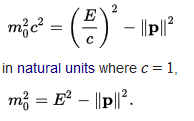My textbook says it is because momentum has to be conserved but I don't see how photons can have momentum since they have zero mass (according to my book).
-
$\begingroup$ I see they have made this a duplicate of "if photons have no mass how can they have momentum". Please read the second, with higher score , answer. You will get confused with the relativistic mass concept which is quite useless at the particle level and confusing. $\endgroup$– anna vCommented Dec 29, 2016 at 14:16
1 Answer
but I don't see how photons can have momentum since they have zero mass (according to my book)
Yes, photons have zero mass according to what we know of physics, but photons also are elementary particles in the standard model of particle physics, and are always in the regime of special relativity. So when one is talking of photons one has to use the concepts of energy and momentum and mass as defined in special relativity:
So the statement "the mass of the photon is zero" means that there is an equality between energy and momentum for the photon and all zero mass particles.
Thus , there cannot be a rest frame for the photon, because it always moves in all frames with velocity c. Two photons though can have an invariant mass, as is the case for the pi0 decay into two photons, and there exists a unique system where the photons have equal and opposite momenta, the rest system of the pi0 in this example.

